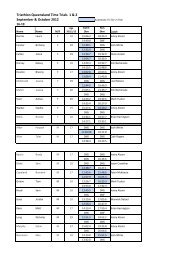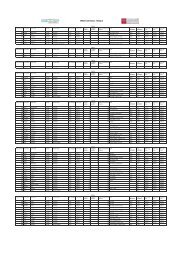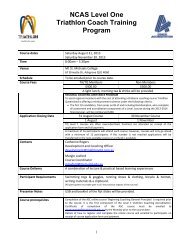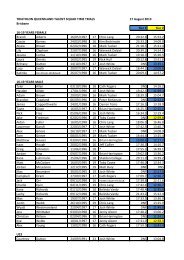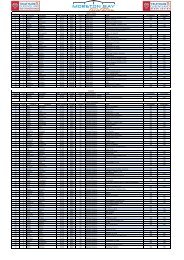Triathlon Event Management & Race Operations ... - Triathlon QLD
Triathlon Event Management & Race Operations ... - Triathlon QLD
Triathlon Event Management & Race Operations ... - Triathlon QLD
Create successful ePaper yourself
Turn your PDF publications into a flip-book with our unique Google optimized e-Paper software.
3.3. Other Important <strong>Race</strong> Operational ItemsCompetitor Rules and ViolationsAll incidents involving questionable competitor behaviour and rule violations must be referee to the<strong>Race</strong> Referee to decide on a penalty, if any e.g. Disqualification or warning. The rules require strictprocedures to be followed by the <strong>Race</strong> Referee to effect a valid disqualification. Similarly, some ruleviolations can only be dealt with by accredited Technical officials who are trained in the properprocedures.Officials – Assistance to CompetitorsMarshals and other officials not only assist with safety, but also play a critical role in ensuring the raceis fair. Consequently, the way in which officials and marshals help competitors can result in acompetitor being disqualified, even if the competitor did not ask for the assistance given. An officialmust not provide assistance in the following circumstances:• Assistance which is not given to provide for the welfare of all competitors or the public e.g.Verbally advising a competitor of the size of a lead (time or distance) held by anothercompetitor.• Assistance that constitutes an unfair advantage e.g. A drink station marshal cannot save alimited supply of food or drink for a favoured competitor, in so doing denying othercompetitors who would have otherwise received the sustenance.• Assistance which is not consistent with an official’s area of responsibility e.g. A marshalwhose job it is to indicate a direction of a course must not provide sustenance, massage orhelp change a tyre.Spectator Areas and Routes<strong>Triathlon</strong> is an exciting sport, particularly when watched from close range. Like most public events,triathlon spectators tend to gather where they choose, unless physically prevented from doing so.Spectators should be controlled to minimise their risk of interfering with the race eg. colliding with orblocking the passage of competitors. A <strong>Race</strong> Committee also has the duty to care for the safety andcomfort of spectators, particularly near start, finish and transition area.The extent to which spectators can and should be controlled must be balanced against the followingconstraints:• Limited supply of crowd control equipment available to a <strong>Race</strong> Committee• General layout of the course, roads and residences that may make it impossible to physicallypartition spectators from competitors• Many kilometres of roads and paths that comprise a course, on which spectators can gather• The need to allow spectators the ability to move freely in and around a race venue• The right of non triathlon public to access the race venue and adjacent properties• The effect of road closures and partitions on surrounding businesses• The desire of spectators to move around a race venue to watch different stages of the raceeg. swim shoreline to transition area, to run course• The unpredictable tendency for people to put themselves at risk by entering onto the courseeg. young childrenPage 20 of 21




